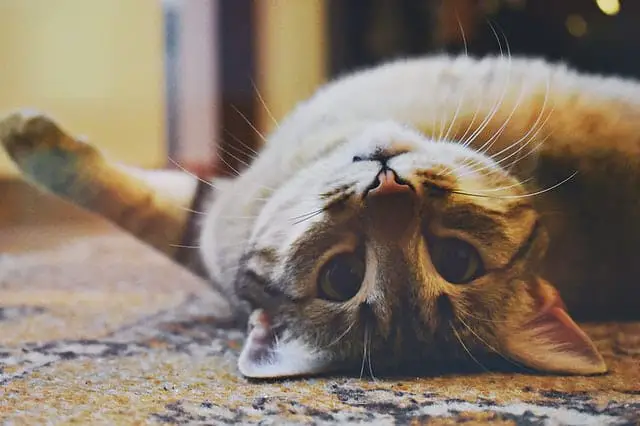Cats are known to do funny things, but some are signs of something serious: this is why the cat turns on itself.

When a cat rolls on the ground and lies on its back it is probably not just greeting us: this movement could be symptomatic of something wrong, especially if it is an elderly cat. Let’s see what are the causes that push a feline to behave in this way and, once the diagnosis is obtained, let’s see how we need to intervene before the situation is definitively compromised. Everything you need to know when a cat turns on itself.
The cat turns on itself: when to worry
Given that a cat loves to play and be the center of attention, we notice how often our cat turns around: it is likely that it is just playing or trying to grab its tail! But if we notice that this behavior repeats itself over time and becomes customary, then it is time to get to the bottom. Certainly by ourselves we could not arrive at a diagnosis of the problem, but our task will be to take the feline to visit the vet and try to keep him calm and serene as much as possible.
Why does a cat turn on itself?
The causes can be various and the doctor will discover them and, as far as possible, treat them. Let’s see what are the main reasons why a cat turns on itself, especially if it is an elderly cat.
- Memory problems: in the case of an elderly cat, he could easily forget the places in the house that belong to him, such as that of the litter box. So we can easily see it wandering aimlessly around the house, looking for something that does not remember where it is.
- Ear problems: whether it is vestibular syndrome or infection, the problem is in the ear. In the first case it is a disorder that prevents him from remaining in balance and coordination in movements. However, it is caused by an infection, of which we may eventually notice signs such as: redness and inflammation. It can be a fungal or viral infection, but also ear tumors or polyps and copes due to trauma.
- Hypertension: when blood pressure rises, organs can be damaged. The resulting problems can be neurological. It is advisable to measure his blood pressure at least once a year, after the completion of the seventh year of life.
- Hypoglycemia: When the sugar level drops too much and too sharply, it could lead to diabetes. Furthermore, among the first symptoms there is precisely that of turning over on itself, as well as epileptic seizures and loss of muscle strength.
- Dementia: or cognitive dysfunction usually affects cats between the ages of 11 and 15. We will notice that in addition to turning over on itself, the cat will go to the toilet out of the litter box, will not recognize family members, will lose interest not only towards us but also in all the daily activities that it used to do with pleasure etc.
- Brain tumor: Unfortunately, the cause could also be very serious. Obviously this serious pathology is accompanied by a series of other symptoms, such as: excessive meowing, hitting the wall with the head, problems with balance and coordination of movements and experiencing severe pain in the head.
What to do to help the cat

The only thing we can do is take the cat to the vet as soon as we notice the first signs of something wrong. There is absolutely no need to waste time, as the situation could worsen and reach an irreversible stage. if the doctor assures us that it is not a health problem, we can contact an expert behaviorist, who will help us solve what appears to be an obsessive-compulsive disorder of the cat.






